- Home
- Gustave Flaubert
Salammbo Page 2
Salammbo Read online
Page 2
CHAPTER II AT SICCA
Two days afterwards the Mercenaries left Carthage.
They had each received a piece of gold on the condition that theyshould go into camp at Sicca, and they had been told with all sorts ofcaresses:
“You are the saviours of Carthage! But you would starve it if youremained there; it would become insolvent. Withdraw! The Republic willbe grateful to you later for all this condescension. We are going tolevy taxes immediately; your pay shall be in full, and galleys shall beequipped to take you back to your native lands.”
They did not know how to reply to all this talk. These men, accustomedas they were to war, were wearied by residence in a town; there wasdifficulty in convincing them, and the people mounted the walls to seethem go away.
They defiled through the street of Khamon, and the Cirta gate,pell-mell, archers with hoplites, captains with soldiers, Lusitanianswith Greeks. They marched with a bold step, rattling their heavycothurni on the paving stones. Their armour was dented by the catapult,and their faces blackened by the sunburn of battles. Hoarse cries issuedfrom their thick beards, their tattered coats of mail flapped upon thepommels of their swords, and through the holes in the brass might beseen their naked limbs, as frightful as engines of war. sarissæ, axes,spears, felt caps and bronze helmets, all swung together with a singlemotion. They filled the street thickly enough to have made the wallscrack, and the long mass of armed soldiers overflowed between the loftybitumen-smeared houses six storys high. Behind their gratings of iron orreed the women, with veiled heads, silently watched the Barbarians pass.
The terraces, fortifications, and walls were hidden beneath the crowdof Carthaginians, who were dressed in garments of black. The sailors’tunics showed like drops of blood among the dark multitude, and nearlynaked children, whose skin shone beneath their copper bracelets,gesticulated in the foliage of the columns, or amid the branches ofa palm tree. Some of the Ancients were posted on the platform of thetowers, and people did not know why a personage with a long beard stoodthus in a dreamy attitude here and there. He appeared in the distanceagainst the background of the sky, vague as a phantom and motionless asstone.
All, however, were oppressed with the same anxiety; it was feared thatthe Barbarians, seeing themselves so strong, might take a fancy to stay.But they were leaving with so much good faith that the Carthaginiansgrew bold and mingled with the soldiers. They overwhelmed them withprotestations and embraces. Some with exaggerated politeness andaudacious hypocrisy even sought to induce them not to leave the city.They threw perfumes, flowers, and pieces of silver to them. They gavethem amulets to avert sickness; but they had spit upon them three timesto attract death, or had enclosed jackal’s hair within them to putcowardice into their hearts. Aloud, they invoked Melkarth’s favour,and in a whisper, his curse.
Then came the mob of baggage, beasts of burden, and stragglers. The sickgroaned on the backs of dromedaries, while others limped along leaningon broken pikes. The drunkards carried leathern bottles, and the greedyquarters of meat, cakes, fruits, butter wrapped in fig leaves, and snowin linen bags. Some were to be seen with parasols in their hands, andparrots on their shoulders. They had mastiffs, gazelles, and panthersfollowing behind them. Women of Libyan race, mounted on asses, inveighedagainst the Negresses who had forsaken the lupanaria of Malqua for thesoldiers; many of them were suckling children suspended on their bosomsby leathern thongs. The mules were goaded out at the point of the sword,their backs bending beneath the load of tents, while there were numbersof serving-men and water-carriers, emaciated, jaundiced with fever,and filthy with vermin, the scum of the Carthaginian populace, who hadattached themselves to the Barbarians.
When they had passed, the gates were shut behind them, but the peopledid not descend from the walls. The army soon spread over the breadth ofthe isthmus.
It parted into unequal masses. Then the lances appeared like tall bladesof grass, and finally all was lost in a train of dust; those of thesoldiers who looked back towards Carthage could now only see its longwalls with their vacant battlements cut out against the edge of the sky.
Then the Barbarians heard a great shout. They thought that some fromamong them (for they did not know their own number) had remained in thetown, and were amusing themselves by pillaging a temple. They laughed agreat deal at the idea of this, and then continued their journey.
They were rejoiced to find themselves, as in former days, marching alltogether in the open country, and some of the Greeks sang the old songof the Mamertines:
“With my lance and sword I plough and reap; I am master of the house!The disarmed man falls at my feet and calls me Lord and Great King.”
They shouted, they leaped, the merriest began to tell stories; thetime of their miseries was past. As they arrived at Tunis, some ofthem remarked that a troop of Balearic slingers was missing. They weredoubtless not far off; and no further heed was paid to them.
Some went to lodge in the houses, others camped at the foot of thewalls, and the townspeople came out to chat with the soldiers.
During the whole night fires were seen burning on the horizon in thedirection of Carthage; the light stretched like giant torches across themotionless lake. No one in the army could tell what festival was beingcelebrated.
On the following day the Barbarian’s passed through a region that wascovered with cultivation. The domains of the patricians succeeded oneanother along the border of the route; channels of water flowedthrough woods of palm; there were long, green lines of olive-trees;rose-coloured vapours floated in the gorges of the hills, while bluemountains reared themselves behind. A warm wind was blowing. Chameleonswere crawling on the broad leaves of the cactus.
The Barbarians slackened their speed.
They marched on in isolated detachments, or lagged behind one another atlong intervals. They ate grapes along the margin of the vines. They layon the grass and gazed with stupefaction upon the large, artificiallytwisted horns of the oxen, the sheep clothed with skins to protect theirwool, the furrows crossing one another so as to form lozenges, and theploughshares like ships’ anchors, with the pomegranate trees that werewatered with silphium. Such wealth of the soil and such inventions ofwisdom dazzled them.
In the evening they stretched themselves on the tents without unfoldingthem; and thought with regret of Hamilcar’s feast, as they fell asleepwith their faces towards the stars.
In the middle of the following day they halted on the bank of a river,amid clumps of rose-bays. Then they quickly threw aside lances, bucklersand belts. They bathed with shouts, and drew water in their helmets,while others drank lying flat on their stomachs, and all in the midst ofthe beasts of burden whose baggage was slipping from them.
Spendius, who was seated on a dromedary stolen in Hamilcar’s parks,perceived Matho at a distance, with his arm hanging against his breast,his head bare, and his face bent down, giving his mule drink, andwatching the water flow. Spendius immediately ran through the crowdcalling him, “Master! master!”
Matho gave him but scant thanks for his blessings, but Spendius paid noheed to this, and began to march behind him, from time to time turningrestless glances in the direction of Carthage.
He was the son of a Greek rhetor and a Campanian prostitute. He had atfirst grown rich by dealing in women; then, ruined by a shipwreck, hehad made war against the Romans with the herdsmen of Samnium. He hadbeen taken and had escaped; he had been retaken, and had worked in thequarries, panted in the vapour-baths, shrieked under torture, passedthrough the hands of many masters, and experienced every frenzy. Atlast, one day, in despair, he had flung himself into the sea from thetop of a trireme where he was working at the oar. Some of Hamilcar’ssailors had picked him up when at the point of death, and had broughthim to the ergastulum of Megara, at Carthage. But, as fugitives were tobe given back to the Romans, he had taken advantage of the confusion tofly with the soldiers.
During the whole of the march he remained near Matho; he brought himfood, assisted him to dismount, and s
pread a carpet in the eveningbeneath his head. Matho at last was touched by these attentions, and bydegrees unlocked his lips.
He had been born in the gulf of Syrtis. His father had taken him on apilgrimage to the temple of Ammon. Then he had hunted elephants in theforests of the Garamantes. Afterwards he had entered the service ofCarthage. He had been appointed tetrarch at the capture of Drepanum.The Republic owed him four horses, twenty-three medimni of wheat, anda winter’s pay. He feared the gods, and wished to die in his nativeland.
Spendius spoke to him of his travels, and of the peoples and templesthat he had visited. He knew many things: he could make sandals,boar-spears and nets; he could tame wild beasts and could cook fish.
Sometimes he would interrupt himself, and utter a hoarse cry from thedepths of his throat; Matho’s mule would quicken his pace, and otherswould hasten after them, and then Spendius would begin again thoughstill torn with agony. This subsided at last on the evening of thefourth day.
They were marching side by side to the right of the army on the side ofa hill; below them stretched the plain lost in the vapours of the night.The lines of soldiers also were defiling below, making undulations inthe shade. From time to time these passed over eminences lit up by themoon; then stars would tremble on the points of the pikes, the helmetswould glimmer for an instant, all would disappear, and others would comeon continually. Startled flocks bleated in the distance, and a somethingof infinite sweetness seemed to sink upon the earth.
Spendius, with his head thrown back and his eyes half-closed, inhaledthe freshness of the wind with great sighs; he spread out his arms,moving his fingers that he might the better feel the cares that streamedover his body. Hopes of vengeance came back to him and transported him.He pressed his hand upon his mouth to check his sobs, and half-swooningwith intoxication, let go the halter of his dromedary, which wasproceeding with long, regular steps. Matho had relapsed into his formermelancholy; his legs hung down to the ground, and the grass made acontinuous rustling as it beat against his cothurni.
The journey, however, spread itself out without ever coming to an end.At the extremity of a plain they would always reach a round-shapedplateau; then they would descend again into a valley, and the mountainswhich seemed to block up the horizon would, in proportion as they wereapproached, glide as it were from their positions. From time to time ariver would appear amid the verdure of tamarisks to lose itself at theturning of the hills. Sometimes a huge rock would tower aloft like theprow of a vessel or the pedestal of some vanished colossus.
At regular intervals they met with little quadrangular temples, whichserved as stations for the pilgrims who repaired to Sicca. They wereclosed like tombs. The Libyans struck great blows upon the doors to havethem opened. But no one inside responded.
Then the cultivation became more rare. They suddenly entered upon beltsof sand bristling with thorny thickets. Flocks of sheep were browsingamong the stones; a woman with a blue fleece about her waist waswatching them. She fled screaming when she saw the soldiers’ pikesamong the rocks.
They were marching through a kind of large passage bordered by twochains of reddish coloured hillocks, when their nostrils were greetedwith a nauseous odour, and they thought that they could see somethingextraordinary on the top of a carob tree: a lion’s head reared itselfabove the leaves.
They ran thither. It was a lion with his four limbs fastened to a crosslike a criminal. His huge muzzle fell upon his breast, and his twofore-paws, half-hidden beneath the abundance of his mane, were spreadout wide like the wings of a bird. His ribs stood severally out beneathhis distended skin; his hind legs, which were nailed against each other,were raised somewhat, and the black blood, flowing through his hair,had collected in stalactites at the end of his tail, which hung downperfectly straight along the cross. The soldiers made merry around; theycalled him consul, and Roman citizen, and threw pebbles into his eyes todrive away the gnats.
But a hundred paces further on they saw two more, and then theresuddenly appeared a long file of crosses bearing lions. Some had beenso long dead that nothing was left against the wood but the remainsof their skeletons; others which were half eaten away had their jawstwisted into horrible grimaces; there were some enormous ones; theshafts of the crosses bent beneath them, and they swayed in the wind,while bands of crows wheeled ceaselessly in the air above their heads.It was thus that the Carthaginian peasants avenged themselves whenthey captured a wild beast; they hoped to terrify the others by suchan example. The Barbarians ceased their laughter, and were long lostin amazement. “What people is this,” they thought, “that amusesitself by crucifying lions!”
They were, besides, especially the men of the North, vaguely uneasy,troubled, and already sick. They tore their hands with the darts of thealoes; great mosquitoes buzzed in their ears, and dysentry was breakingout in the army. They were weary at not yet seeing Sicca. They wereafraid of losing themselves and of reaching the desert, the country ofsands and terrors. Many even were unwilling to advance further. Othersstarted back to Carthage.
At last on the seventh day, after following the base of a mountain for along time, they turned abruptly to the right, and there then appeareda line of walls resting on white rocks and blending with them. Suddenlythe entire city rose; blue, yellow, and white veils moved on the wallsin the redness of the evening. These were the priestesses of Tanith,who had hastened hither to receive the men. They stood ranged along therampart, striking tabourines, playing lyres, and shaking crotala, whilethe rays of the sun, setting behind them in the mountains of Numidia,shot between the strings of their lyres over which their naked arms werestretched. At intervals their instruments would become suddenly still,and a cry would break forth strident, precipitate, frenzied, continuous,a sort of barking which they made by striking both corners of the mouthwith the tongue. Others, more motionless than the Sphynx, rested ontheir elbows with their chins on their hands, and darted their greatblack eyes upon the army as it ascended.
Although Sicca was a sacred town it could not hold such a multitude; thetemple alone, with its appurtenances, occupied half of it. Accordinglythe Barbarians established themselves at their ease on the plain;those who were disciplined in regular troops, and the rest according tonationality or their own fancy.
The Greeks ranged their tents of skin in parallel lines; the Iberiansplaced their canvas pavilions in a circle; the Gauls made themselveshuts of planks; the Libyans cabins of dry stones, while the Negroes withtheir nails hollowed out trenches in the sand to sleep in. Many, notknowing where to go, wandered about among the baggage, and at nightfalllay down in their ragged mantles on the ground.
The plain, which was wholly bounded by mountains, expanded around them.Here and there a palm tree leaned over a sand hill, and pines and oaksflecked the sides of the precipices: sometimes the rain of a storm wouldhang from the sky like a long scarf, while the country everywhere wasstill covered with azure and serenity; then a warm wind would drivebefore it tornadoes of dust, and a stream would descend in cascades fromthe heights of Sicca, where, with its roofing of gold on its columns ofbrass, rose the temple of the Carthaginian Venus, the mistress of theland. She seemed to fill it with her soul. In such convulsions of thesoil, such alternations of temperature, and such plays of light wouldshe manifest the extravagance of her might with the beauty of hereternal smile. The mountains at their summits were crescent-shaped;others were like women’s bosoms presenting their swelling breasts, andthe Barbarians felt a heaviness that was full of delight weighing downtheir fatigues.
Spendius had bought a slave with the money brought him by his dromedary.The whole day long he lay asleep stretched before Matho’s tent. Oftenhe would awake, thinking in his dreams that he heard the whistling ofthe thongs; with a smile he would pass his hands over the scars on hislegs at the place where the fetters had long been worn, and then hewould fall asleep again.
Matho accepted his companionship, and when he went out Spendius wouldescort him like a lictor with a long sword on his thigh; or perha
psMatho would rest his arm carelessly on the other’s shoulder, forSpendius was small.
One evening when they were passing together through the streets in thecamp they perceived some men covered with white cloaks; among them wasNarr’ Havas, the prince of the Numidians. Matho started.
“Your sword!” he cried; “I will kill him!”
“Not yet!” said Spendius, restraining him. Narr’ Havas was alreadyadvancing towards him.
He kissed both thumbs in token of alliance, showing nothing of the angerwhich he had experienced at the drunkenness of the feast; then he spokeat length against Carthage, but did not say what brought him among theBarbarians.
“Was it to betray them, or else the Republic?” Spendius askedhimself; and as he expected to profit by every disorder, he feltgrateful to Narr’ Havas for the future perfidies of which he suspectedhim.
The chief of the Numidians remained amongst the Mercenaries. He appeareddesirous of attaching Matho to himself. He sent him fat goats, golddust, and ostrich feathers. The Libyan, who was amazed at such caresses,was in doubt whether to respond to them or to become exasperated atthem. But Spendius pacified him, and Matho allowed himself to be ruledby the slave, remaining ever irresolute and in an unconquerable torpor,like those who have once taken a draught of which they are to die.
One morning when all three went out lion-hunting, Narr’ Havasconcealed a dagger in his cloak. Spendius kept continually behind him,and when they returned the dagger had not been drawn.
Another time Narr’ Havas took them a long way off, as far as theboundaries of his kingdom. They came to a narrow gorge, and Narr’Havas smiled as he declared that he had forgotten the way. Spendiusfound it again.
But most frequently Matho would go off at sunrise, as melancholy asan augur, to wander about the country. He would stretch himself on thesand, and remain there motionless until the evening.
He consulted all the soothsayers in the army one after theother,—those who watch the trail of serpents, those who read thestars, and those who breathe upon the ashes of the dead. He swallowedgalbanum, seseli, and viper’s venom which freezes the heart; Negrowomen, singing barbarous words in the moonlight, pricked the skin ofhis forehead with golden stylets; he loaded himself with necklacesand charms; he invoked in turn Baal-Khamon, Moloch, the seven Kabiri,Tanith, and the Venus of the Greeks. He engraved a name upon a copperplate, and buried it in the sand at the threshold of his tent. Spendiusused to hear him groaning and talking to himself.
One night he went in.
Matho, as naked as a corpse, was lying on a lion’s skin flat on hisstomach, with his face in both his hands; a hanging lamp lit up hisarmour, which was hooked on to the tent-pole above his head.
“You are suffering?” said the slave to him. “What is the matterwith you? Answer me?” And he shook him by the shoulder calling himseveral times, “Master! master!”
At last Matho lifted large troubled eyes towards him.
“Listen!” he said in a low voice, and with a finger on his lips.“It is the wrath of the Gods! Hamilcar’s daughter pursues me! I amafraid of her, Spendius!” He pressed himself close against his breastlike a child terrified by a phantom. “Speak to me! I am sick! I wantto get well! I have tried everything! But you, you perhaps know somestronger gods, or some resistless invocation?”
“For what purpose?” asked Spendius.
Striking his head with both his fists, he replied:
“To rid me of her!”
Then speaking to himself with long pauses he said:
“I am no doubt the victim of some holocaust which she has promised tothe gods?—She holds me fast by a chain which people cannot see. If Iwalk, it is she that is advancing; when I stop, she is resting! Her eyesburn me, I hear her voice. She encompasses me, she penetrates me. Itseems to me that she has become my soul!
“And yet between us there are, as it were, the invisible billows of aboundless ocean! She is far away and quite inaccessible! The splendourof her beauty forms a cloud of light around her, and at times I thinkthat I have never seen her—that she does not exist—and that it isall a dream!”
Matho wept thus in the darkness; the Barbarians were sleeping. Spendius,as he looked at him, recalled the young men who once used to entreathim with golden cases in their hands, when he led his herd of courtesansthrough the towns; a feeling of pity moved him, and he said—
“Be strong, my master! Summon your will, and beseech the gods no more,for they turn not aside at the cries of men! Weeping like a coward! Andyou are not humiliated that a woman can cause you so much suffering?”
“Am I a child?” said Matho. “Do you think that I am moved by theirfaces and songs? We kept them at Drepanum to sweep out our stables. Ihave embraced them amid assaults, beneath falling ceilings, and whilethe catapult was still vibrating!—But she, Spendius, she!—”
The slave interrupted him:
“If she were not Hanno’s daughter—”
“No!” cried Matho. “She has nothing in common with the daughtersof other men! Have you seen her great eyes beneath her great eyebrows,like suns beneath triumphal arches? Think: when she appeared all thetorches grew pale. Her naked breast shone here and there through thediamonds of her necklace; behind her you perceived as it were the odourof a temple, and her whole being emitted something that was sweeter thanwine and more terrible than death. She walked, however, and then shestopped.”
He remained gaping with his head cast down and his eyeballs fixed.
“But I want her! I need her! I am dying for her! I am transported withfrenzied joy at the thought of clasping her in my arms, and yet I hateher, Spendius! I should like to beat her! What is to be done? I have amind to sell myself and become her slave! You have been that! You wereable to get sight of her; speak to me of her! Every night she ascendsto the terrace of her palace, does she not? Ah! the stones must quiverbeneath her sandals, and the stars bend down to see her!”
He fell back in a perfect frenzy, with a rattling in his throat like awounded bull.
Then Matho sang: “He pursued into the forest the female monster, whosetail undulated over the dead leaves like a silver brook.” And withlingering tones he imitated Salammbô’s voice, while his outspreadhands were held like two light hands on the strings of a lyre.
To all the consolations offered by Spendius, he repeated the same words;their nights were spent in these wailings and exhortations.
Matho sought to drown his thoughts in wine. After his fits ofdrunkenness he was more melancholy still. He tried to divert himself athuckle-bones, and lost the gold plates of his necklace one by one. Hehad himself taken to the servants of the Goddess; but he came down thehill sobbing, like one returning from a funeral.
Spendius, on the contrary, became more bold and gay. He was to be seenin the leafy taverns discoursing in the midst of the soldiers. He mendedold cuirasses. He juggled with daggers. He went and gathered herbs inthe fields for the sick. He was facetious, dexterous, full of inventionand talk; the Barbarians grew accustomed to his services, and he came tobe loved by them.
However, they were awaiting an ambassador from Carthage to bringthem mules laden with baskets of gold; and ever beginning the samecalculation over again, they would trace figures with their fingers inthe sand. Every one was arranging his life beforehand; they would haveconcubines, slaves, lands; others intended to bury their treasure,or risk it on a vessel. But their tempers were provoked by want ofemployment; there were constant disputes between horse-soldiers andfoot-soldiers, Barbarians and Greeks, while there was a never-ending dinof shrill female voices.
Every day men came flocking in nearly naked, and with grass on theirheads to protect them from the sun; they were the debtors of the richCarthaginians and had been forced to till the lands of the latter, buthad escaped. Libyans came pouring in with peasants ruined by the taxes,outlaws, and malefactors. Then the horde of traders, all the dealers inwine and oil, who were furious at not being paid, laid the blame uponthe Republic. Spendius declaimed against it. S
oon the provisions ranlow; and there was talk of advancing in a body upon Carthage, andcalling in the Romans.
One evening, at supper-time, dull cracked sounds were heard approaching,and something red appeared in the distance among the undulations of thesoil.
It was a large purple litter, adorned with ostrich feathers at thecorners. Chains of crystal and garlands of pearls beat against theclosed hangings. It was followed by camels sounding the great bellsthat hung at their breasts, and having around them horsemen clad fromshoulder to heel in armour of golden scales.
They halted three hundred paces from the camp to take their roundbucklers, broad swords, and Boeotian helmets out of the cases which theycarried behind their saddles. Some remained with the camels, whilethe others resumed their march. At last the ensigns of the Republicappeared, that is to say, staves of blue wood terminated in horses’heads or fir cones. The Barbarians all rose with applause; the womenrushed towards the guards of the Legion and kissed their feet.
The litter advanced on the shoulders of twelve Negroes who walked instep with short, rapid strides; they went at random to right or left,being embarrassed by the tent-ropes, the animals that were strayingabout, or the tripods where food was being cooked. Sometimes a fat hand,laden with rings, would partially open the litter, and a hoarse voicewould utter loud reproaches; then the bearers would stop and take adifferent direction through the camp.
But the purple curtains were raised, and a human head, impassible andbloated, was seen resting on a large pillow; the eyebrows, which werelike arches of ebony, met each other at the points; golden dust sparkledin the frizzled hair, and the face was so wan that it looked as ifit had been powdered with marble raspings. The rest of the body wasconcealed beneath the fleeces which filled the litter.
In the man so reclining the soldiers recognised the Suffet Hanno, hewhose slackness had assisted to lose the battle of the Ægatian islands;and as to his victory at Hecatompylos over the Libyans, even if he didbehave with clemency, thought the Barbarians, it was owing to cupidity,for he had sold all the captives on his own account, although he hadreported their deaths to the Republic.
After seeking for some time a convenient place from which to haranguethe soldiers, he made a sign; the litter stopped, and Hanno, supportedby two slaves, put his tottering feet to the ground.
He wore boots of black felt strewn with silver moons. His legs wereswathed in bands like those wrapped about a mummy, and the flesh creptthrough the crossings of the linen; his stomach came out beyond thescarlet jacket which covered his thighs; the folds of his neck fell downto his breast like the dewlaps of an ox; his tunic, which was paintedwith flowers, was bursting at the arm-pits; he wore a scarf, a girdle,and an ample black cloak with laced double-sleeves. But the abundance ofhis garments, his great necklace of blue stones, his golden clasps, andheavy earrings only rendered his deformity still more hideous. He mighthave been taken for some big idol rough-hewn in a block of stone; fora pale leprosy, which was spread over his whole body, gave him theappearance of an inert thing. His nose, however, which was hooked likea vulture’s beak, was violently dilated to breathe in the air, and hislittle eyes, with their gummed lashes, shone with a hard and metalliclustre. He held a spatula of aloe-wood in his hand wherewith to scratchhis skin.
At last two heralds sounded their silver horns; the tumult subsided, andHanno commenced to speak.
He began with an eulogy of the gods and the Republic; the Barbariansought to congratulate themselves on having served it. But they must showthemselves more reasonable; times were hard, “and if a master has onlythree olives, is it not right that he should keep two for himself?”
The old Suffet mingled his speech in this way with proverbs andapologues, nodding his head the while to solicit some approval.
He spoke in Punic, and those surrounding him (the most alert, whohad hastened thither without their arms), were Campanians, Gauls, andGreeks, so that no one in the crowd understood him. Hanno, perceivingthis, stopped and reflected, swaying himself heavily from one leg to theother.
It occurred to him to call the captains together; then his heraldsshouted the order in Greek, the language which, from the time ofXanthippus, had been used for commands in the Carthaginian armies.
The guards dispersed the mob of soldiers with strokes of the whip; andthe captains of the Spartan phalanxes and the chiefs of the Barbariancohorts soon arrived with the insignia of their rank, and in thearmour of their nation. Night had fallen, a great tumult was spreadingthroughout the plain; fires were burning here and there; and thesoldiers kept going from one to another asking what the matter was, andwhy the Suffet did not distribute the money?
He was setting the infinite burdens of the Republic before the captains.Her treasury was empty. The tribute to Rome was crushing her. “We arequite at a loss what to do! She is much to be pitied!”
From time to time he would rub his limbs with his aloe-wood spatula,or perhaps he would break off to drink a ptisan made of the ashes of aweasel and asparagus boiled in vinegar from a silver cup handed tohim by a slave; then he would wipe his lips with a scarlet napkin andresume:
“What used to be worth a shekel of silver is now worth three shekelsof gold, while the cultivated lands which were abandoned during the warbring in nothing! Our purpura fisheries are nearly gone, and even pearlsare becoming exhorbitant; we have scarcely unguents enough for theservice of the gods! As for the things of the table, I shall say nothingabout them; it is a calamity! For want of galleys we are without spices,and it is a matter of great difficulty to procure silphium on accountof the rebellions on the Cyrenian frontier. Sicily, where so many slavesused to be had, is now closed to us! Only yesterday I gave more moneyfor a bather and four scullions than I used at one time to give for apair of elephants!”
He unrolled a long piece of papyrus; and, without omitting a singlefigure, read all the expenses that the government had incurred; so muchfor repairing the temples, for paving the streets, for the constructionof vessels, for the coral-fisheries, for the enlargement of theSyssitia, and for engines in the mines in the country of theCantabrians.
But the captains understood Punic as little as the soldiers, althoughthe Mercenaries saluted one another in that language. It was usual toplace a few Carthaginian officers in the Barbarian armies to act asinterpreters; after the war they had concealed themselves through fearof vengeance, and Hanno had not thought of taking them with him; hishollow voice, too, was lost in the wind.
The Greeks, girthed in their iron waist-belts, strained their ears asthey strove to guess at his words, while the mountaineers, covered withfurs like bears, looked at him with distrust, or yawned as they leanedon their brass-nailed clubs. The heedless Gauls sneered as theyshook their lofty heads of hair, and the men of the desert listenedmotionless, cowled in their garments of grey wool; others kept coming upbehind; the guards, crushed by the mob, staggered on their horses; theNegroes held out burning fir branches at arm’s length; and the bigCarthaginian, mounted on a grassy hillock, continued his harangue.
The Barbarians, however, were growing impatient; murmuring arose, andevery one apostrophized him. Hanno gesticulated with his spatula; andthose who wished the others to be quiet shouted still more loudly,thereby adding to the din.
Suddenly a man of mean appearance bounded to Hanno’s feet, snatchedup a herald’s trumpet, blew it, and Spendius (for it was he) announcedthat he was going to say something of importance. At this declaration,which was rapidly uttered in five different languages, Greek, Latin,Gallic, Libyan and Balearic, the captains, half laughing and halfsurprised, replied: “Speak! Speak!”
Spendius hesitated; he trembled; at last, addressing the Libyans whowere the most numerous, he said to them:
“You have all heard this man’s horrible threats!”
Hanno made no exclamation, therefore he did not understand Libyan; and,to carry on the experiment, Spendius repeated the same phrase in theother Barbarian dialects.
They looked at one another in astonishment; t
hen, as by a tacitagreement, and believing perhaps that they had understood, they benttheir heads in token of assent.
Then Spendius began in vehement tones:
“He said first that all the Gods of the other nations were but dreamsbesides the Gods of Carthage! He called you cowards, thieves, liars,dogs, and the sons of dogs! But for you (he said that!) the Republicwould not be forced to pay excessive tribute to the Romans; and throughyour excesses you have drained it of perfumes, aromatics, slaves,and silphium, for you are in league with the nomads on the Cyrenianfrontier! But the guilty shall be punished! He read the enumeration oftheir torments; they shall be made to work at the paving of the streets,at the equipment of the vessels, at the adornment of the Syssitia, whilethe rest shall be sent to scrape the earth in the mines in the countryof the Cantabrians.”
Spendius repeated the same statements to the Gauls, Greeks, Campaniansand Balearians. The Mercenaries, recognising several of the propernames which had met their ears, were convinced that he was accuratelyreporting the Suffet’s speech. A few cried out to him, “You lie!”but their voices were drowned in the tumult of the rest; Spendius added:
“Have you not seen that he has left a reserve of his horse-soldiersoutside the camp? At a given signal they will hasten hither to slay youall.”
The Barbarians turned in that direction, and as the crowd was thenscattering, there appeared in the midst of them, and advancing with theslowness of a phantom, a human being, bent, lean, entirely naked, andcovered down to his flanks with long hair bristling with dried leaves,dust and thorns. About his loins and his knees he had wisps of straw andlinen rags; his soft and earthy skin hung on his emaciated limbs liketatters on dried boughs; his hands trembled with a continuous quivering,and as he walked he leaned on a staff of olive-wood.
He reached the Negroes who were bearing the torches. His pale gums weredisplayed in a sort of idiotic titter; his large, scared eyes gazed uponthe crowd of Barbarians around him.
But uttering a cry of terror he threw himself behind them, shieldinghimself with their bodies. “There they are! There they are!” hestammered out, pointing to the Suffet’s guards, who were motionlessin their glittering armour. Their horses, dazzled by the light of thetorches which crackled in the darkness, were pawing the ground; thehuman spectre struggled and howled:
“They have killed them!”
At these words, which were screamed in Balearic, some Balearians came upand recognised him; without answering them he repeated:
“Yes, all killed, all! crushed like grapes! The fine young men! theslingers! my companions and yours!”
They gave him wine to drink, and he wept; then he launched forth intospeech.
Spendius could scarcely repress his joy, as he explained the horrorsrelated by Zarxas to the Greeks and Libyans; he could not believe them,so appropriately did they come in. The Balearians grew pale as theylearned how their companions had perished.
It was a troop of three hundred slingers who had disembarked the eveningbefore, and had on that day slept too late. When they reached thesquare of Khamon the Barbarians were gone, and they found themselvesdefenceless, their clay bullets having been put on the camels with therest of the baggage. They were allowed to advance into the street ofSatheb as far as the brass sheathed oaken gate; then the people with asingle impulse had sprung upon them.
Indeed, the soldiers remembered a great shout; Spendius, who was flyingat the head of the columns, had not heard it.
Then the corpses were placed in the arms of the Patæc gods that fringedthe temple of Khamon. They were upbraided with all the crimes of theMercenaries; their gluttony, their thefts, their impiety, their disdain,and the murder of the fishes in Salammbô’s garden. Their bodies weresubjected to infamous mutilations; the priests burned their hairin order to torture their souls; they were hung up in pieces in themeat-shops; some even buried their teeth in them, and in the eveningfuneral-piles were kindled at the cross-ways to finish them.
These were the flames that had gleamed from a distance across the lake.But some houses having taken fire, any dead or dying that remained werespeedily thrown over the walls; Zarxas had remained among the reeds onthe edge of the lake until the following day; then he had wandered aboutthrough the country, seeking for the army by the footprints in the dust.In the morning he hid himself in caves; in the evening he resumed hismarch with his bleeding wounds, famished, sick, living on roots andcarrion; at last one day he perceived lances on the horizon, and hehad followed them, for his reason was disturbed through his terrors andmiseries.
The indignation of the soldiers, restrained so long as he was speaking,broke forth like a tempest; they were going to massacre the guardstogether with the Suffet. A few interposed, saying that they ought tohear him and know at least whether they should be paid. Then they allcried: “Our money!” Hanno replied that he had brought it.
They ran to the outposts, and the Suffet’s baggage arrived in themidst of the tents, pressed forward by the Barbarians. Without waitingfor the slaves, they very quickly unfastened the baskets; in them theyfound hyacinth robes, sponges, scrapers, brushes, perfumes, and antimonypencils for painting the eyes—all belonging to the guards, who wererich men and accustomed to such refinements. Next they uncovered a largebronze tub on a camel: it belonged to the Suffet who had it for bathingin during his journey; for he had taken all manner of precautions, evengoing so far as to bring caged weasels from Hecatompylos, which wereburnt alive to make his ptisan. But, as his malady gave him a greatappetite, there were also many comestibles and many wines, pickle, meatsand fishes preserved in honey, with little pots of Commagene, or meltedgoose-fat covered with snow and chopped straw. There was a considerablesupply of it; the more they opened the baskets the more they found, andlaughter arose like conflicting waves.
As to the pay of the Mercenaries it nearly filled two esparto-grassbaskets; there were even visible in one of them some of the leatherndiscs which the Republic used to economise its specie; and as theBarbarians appeared greatly surprised, Hanno told them that, theiraccounts being very difficult, the Ancients had not had leisure toexamine them. Meanwhile they had sent them this.
Then everything was in disorder and confusion: mules, serving men,litter, provisions, and baggage. The soldiers took the coin in the bagsto stone Hanno. With great difficulty he was able to mount an ass; andhe fled, clinging to its hair, howling, weeping, shaken, bruised, andcalling down the curse of all the gods upon the army. His broad necklaceof precious stones rebounded up to his ears. His cloak which was toolong, and which trailed behind him, he kept on with his teeth, andfrom afar the Barbarians shouted at him, “Begone coward! pig! sink ofMoloch! sweat your gold and your plague! quicker! quicker!” The routedescort galloped beside him.
But the fury of the Barbarians did not abate. They remembered thatseveral of them who had set out for Carthage had not returned; no doubtthey had been killed. So much injustice exasperated them, and they beganto pull up the stakes of their tents, to roll up their cloaks, and tobridle their horses; every one took his helmet and sword, and instantlyall was ready. Those who had no arms rushed into the woods to cutstaves.
Day dawned; the people of Sicca were roused, and stirring in thestreets. “They are going to Carthage,” said they, and the rumour ofthis soon spread through the country.
From every path and every ravine men arose. Shepherds were seen runningdown from the mountains.
Then, when the Barbarians had set out, Spendius circled the plain,riding on a Punic stallion, and attended by his slave, who led a thirdhorse.
A single tent remained. Spendius entered it.
“Up, master! rise! we are departing!”
“And where are you going?” asked Matho.
“To Carthage!” cried Spendius.
Matho bounded upon the horse which the slave held at the door.

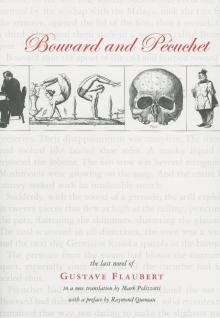 Bouvard and Pecuchet
Bouvard and Pecuchet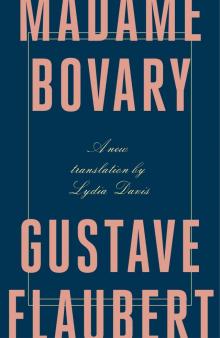 Madame Bovary
Madame Bovary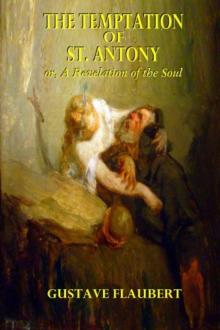 The Temptation of St. Antony
The Temptation of St. Antony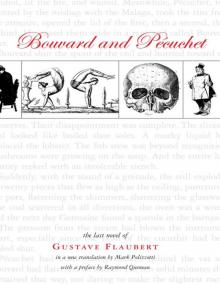 Bouvard and Pécuchet: A Tragi-comic Novel of Bourgeois Life, part 1
Bouvard and Pécuchet: A Tragi-comic Novel of Bourgeois Life, part 1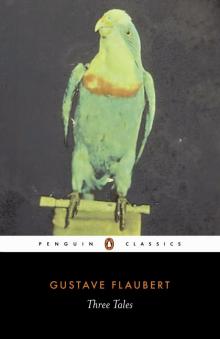 Three Tales
Three Tales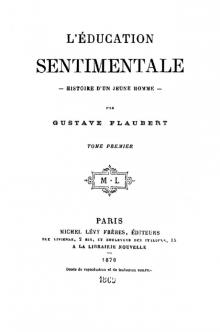 Education sentimentale. English
Education sentimentale. English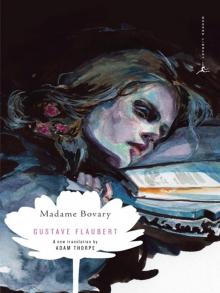 Madame Bovary (Modern Library)
Madame Bovary (Modern Library)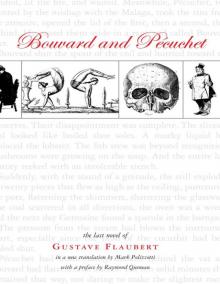 Bouvard and Pécuchet: A Tragi-comic Novel of Bourgeois Life, part 2
Bouvard and Pécuchet: A Tragi-comic Novel of Bourgeois Life, part 2 Sentimental Education; Or, The History of a Young Man. Volume 1
Sentimental Education; Or, The History of a Young Man. Volume 1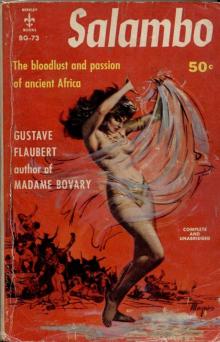 Salammbo
Salammbo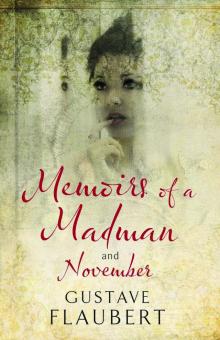 Memoirs of a Madman and November
Memoirs of a Madman and November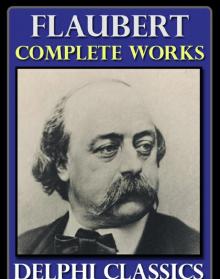 Complete Works of Gustave Flaubert
Complete Works of Gustave Flaubert